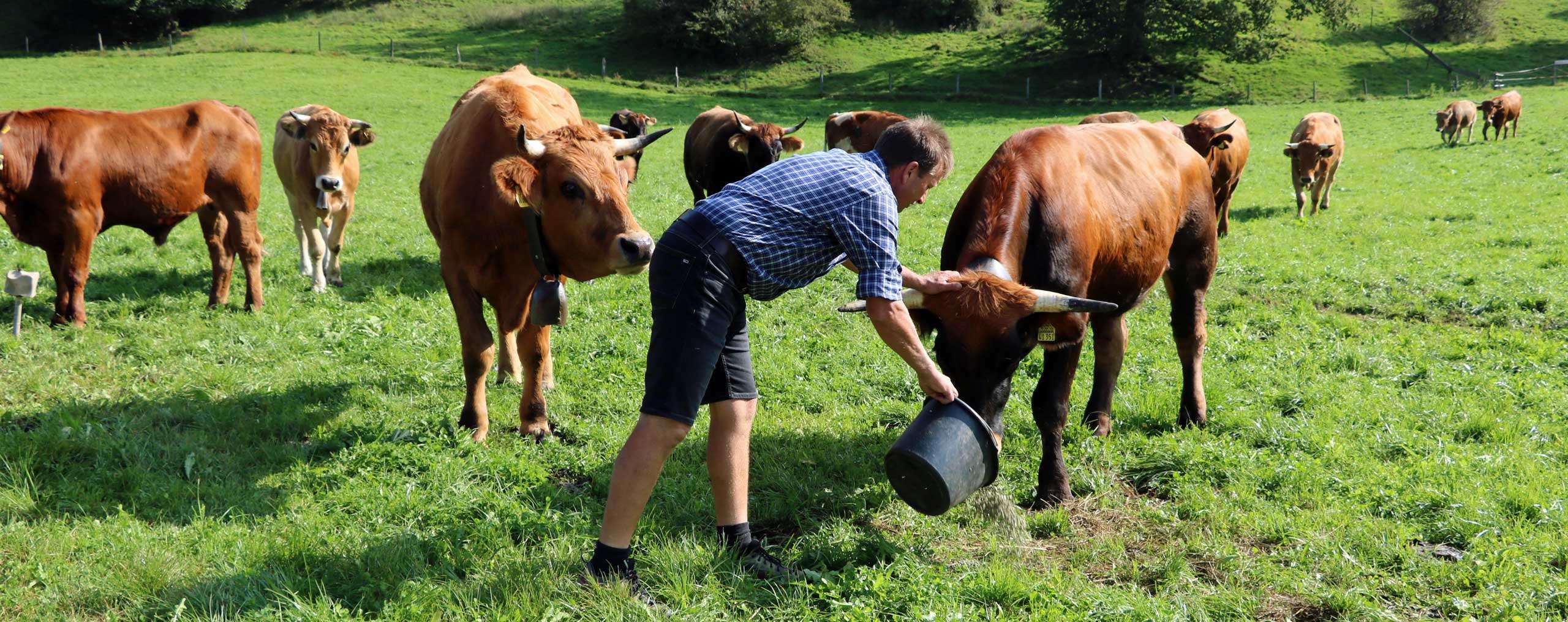Naturland added value
STANDARD COMPARISON: NATURLAND VS. EU ORGANIC
Why Naturland is more than "just" organic and how it differs from EU organic.
Naturland farmers often have to comply with even stricter rules than those set out by the EU Organic Regulation. Find out why Naturland is more than "just" organic and how it differs from EU organic.

General
Naturland organic
EU organic
Naturland farms have to convert to fully organic production. This applies to both crop cultivation and livestock farming.

Partial farm conversions are possible. Individual units of the farm can be farmed conventionally. This means that chemical fertilisers and pesticides may be present on the farm site. This makes inspections much more complicated.
From the first day of the conversion, genetically modified feeds, seeds, animals and processing ingredients are prohibited.

The use of additives and processing agents modified via genetic engineering may be permitted by the government, as long as they're not available in organic quality.
Naturland farms must also adhere to social standards which govern social provisions for employees, ban child labour and promote equality, amongst other things.

No rules
All Naturland standards apply equally to both national and international member farms.

Different standards (and quality standards) may apply in EU and non-EU countries.
Rules on sustainable water use in areas with scarce water supplies (e.g. creation of a water management plan, use of efficient, water-saving irrigation systems, etc.).

No rules
CROP CULTIVATION
Naturland organic
EU organic
Legumes such as clover bind nitrogen from the air. They are therefore a firm favourite in Naturland crop rotations. A minimum proportion is required.

No binding rule
Organic fertilisation is limited to 112 kg nitrogen/ha per year (except on special crops, e.g. vegetables grown under glass or in tunnels).

Only farmyard manure is limited (to 170 kg nitrogen/ha per year). No limitation on the total amount of fertiliser. Additional commercial fertilisers may be purchased (this would therefore lead to significantly higher fertiliser inputs).
Restrictions on the origin and type of purchased organic fertilisers
- Only solid manure (except poultry manure) from conventional farms.
- Conventional poultry manure and conventional slurry/liquid manure are banned.
- Meat, blood and bone meals are banned (even for use as fertiliser).

Virtually no restrictions on imported farmyard manures:
- even purchased conventional slurry/liquid manure and poultry manure.
- Meat, blood and bone meals are allowed as purchased organic fertilisers.
Growing vegetables in sacks and containers is not permitted.

Vegetables may be grown in sacks and containers. Plants are only fed with a nutrient solution.
CMS (cytoplasmic male sterility) hybrid plants produced through protoplast fusion are banned.
(Transfer of genetic material from one genus to another in a way that would not be possible with traditional breeding techniques).

Use of CMS hybrids permitted.
Use of copper (Cu salts) strictly limited in quantity: max. 3 kg/ha per year or max. 4 kg/ha per year in hop cultivation.

Use of copper: significantly higher quantities permitted. Up to 6 kg copper/ha per year.
Proportion of peat used in other substrates restricted to 50% (80% for seedlings), no extensive application to improve soils permitted.

Peat proportions not restricted (100% peat in substrates) and peat can be spread to improve soils.
LIVESTOCK FARMING
Naturland organic
EU organic
Permissible stocking density more strictly limited to ensure a balanced ratio between forage and manure spreading areas

Significantly higher stocking densities permitted, along with associated negative consequences (groundwater, nitrate accumulation, etc.).
Stocking density upper limit per hectare of cultivable farmland:
- 140 hens
- 280 broilers
- 10 fattening pigs

Significantly higher stocking density upper limit per hectare of cultivable farmland:
- 230 hens
- 580 broilers
- 14 fattening pigs
Annual animal welfare inspection in addition to the organic inspection.

No rules
A minimum of 50% of fodder must be home-grown (nutrient cycle) – even for pigs and poultry.

For pigs and poultry, only 20% of fodder must be home-grown or produced by another farm “within the same region”.
Dairy cattle/suckler cows: Feeding only silage all year round is banned. Green fodder must be supplied during summer.

No rules, i.e. feeding only silage during summer is permitted even if fresh grass is available.
Aquaculture
Naturland organic
EU organic
In the interests of animal welfare and eco-balancing, stocking densities are strictly limited to:
- 20 kg trout per cubic metre
- 10 kg sea bream and sea bass per cubic metre
- 160 g prawns per square metre

Significantly higher upper limits apply to EU organic farms:
- 25 kg trout per cubic metre
- 15 kg sea bream and sea bass per cubic metre
- 240 g prawns per square metre
The use of antibiotics and conventional animal medicines on prawns is prohibited.

The use of antibiotics and conventional animal medicines on prawns during farming, and sulphites during processing, is permitted.
Regular testing on water, sediment, feed and end products is mandatory.

Tests are not required.
Prawn farmers must also commit to reforesting former mangrove forests.

No rules on reforesting.
FOOD PROCESSING
Naturland organic
EU organic
Traceability across all intermediaries right back to the producer.

No mandatory traceability back to the producer.
Max. 23 food additives permitted.

Max. 53 food additives permitted.
Natural flavourings and enzymes are approved on a restricted basis and individually for each product group.

Blanket authorisation of all natural flavourings and enzymes.



